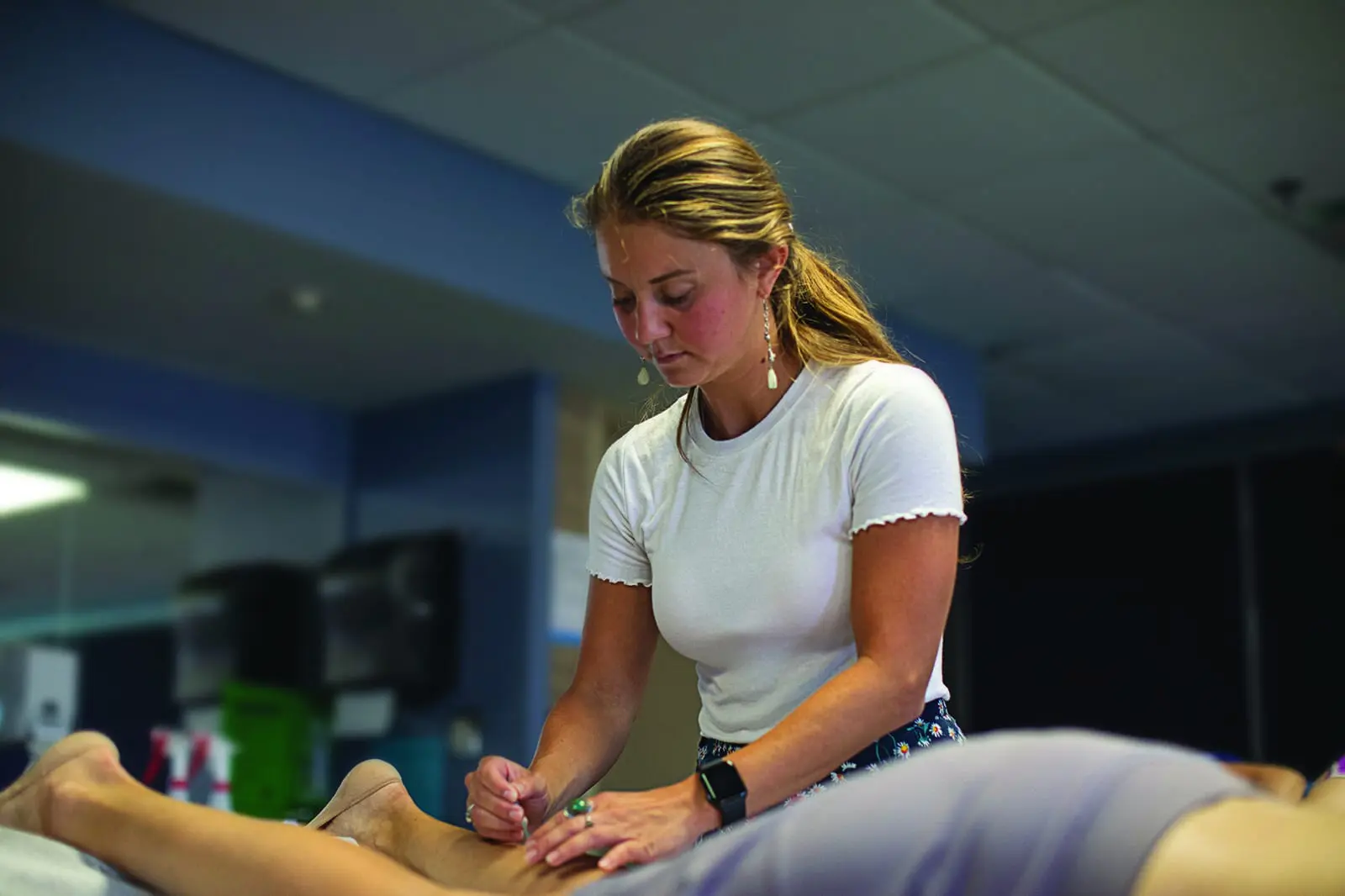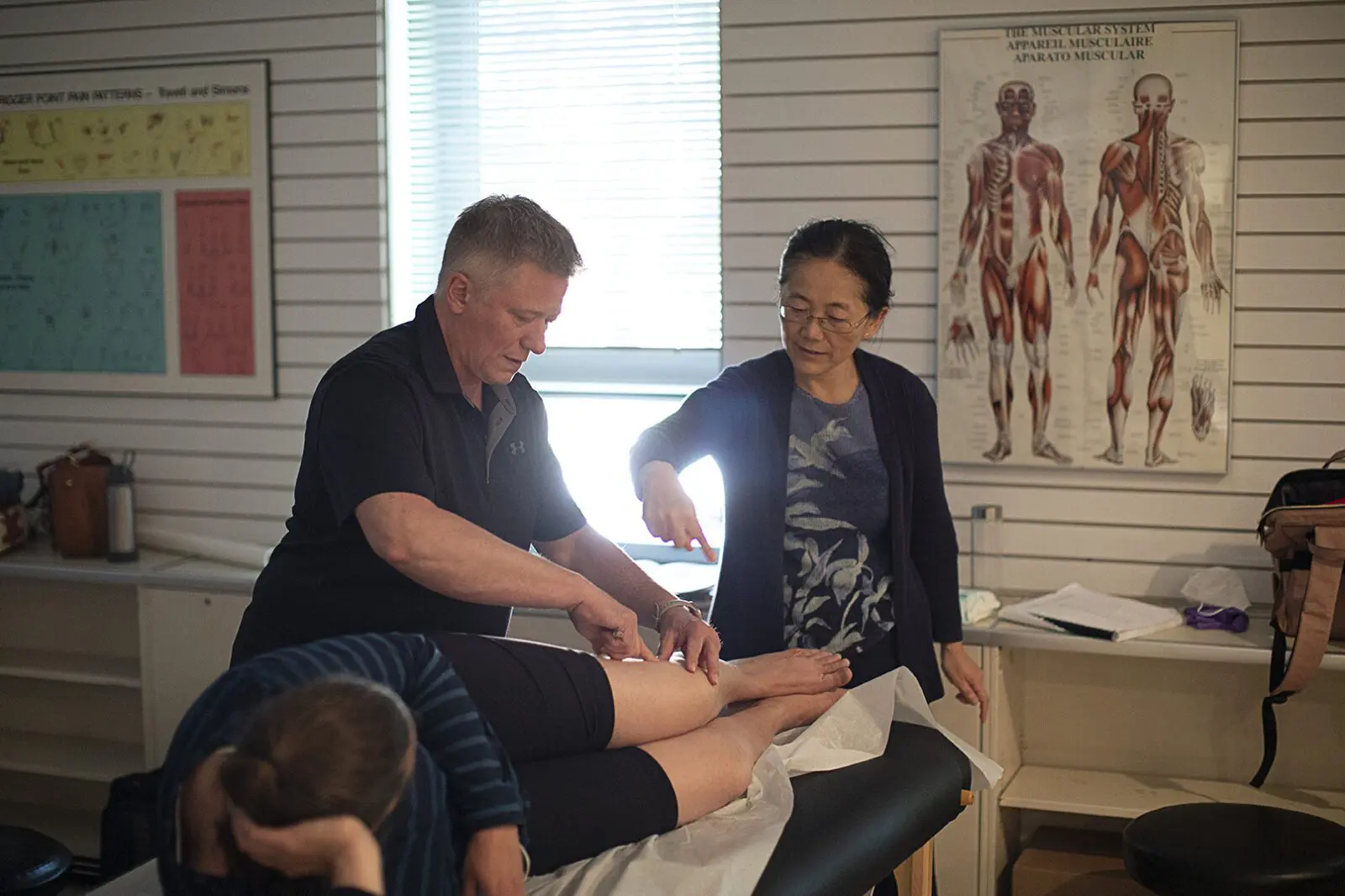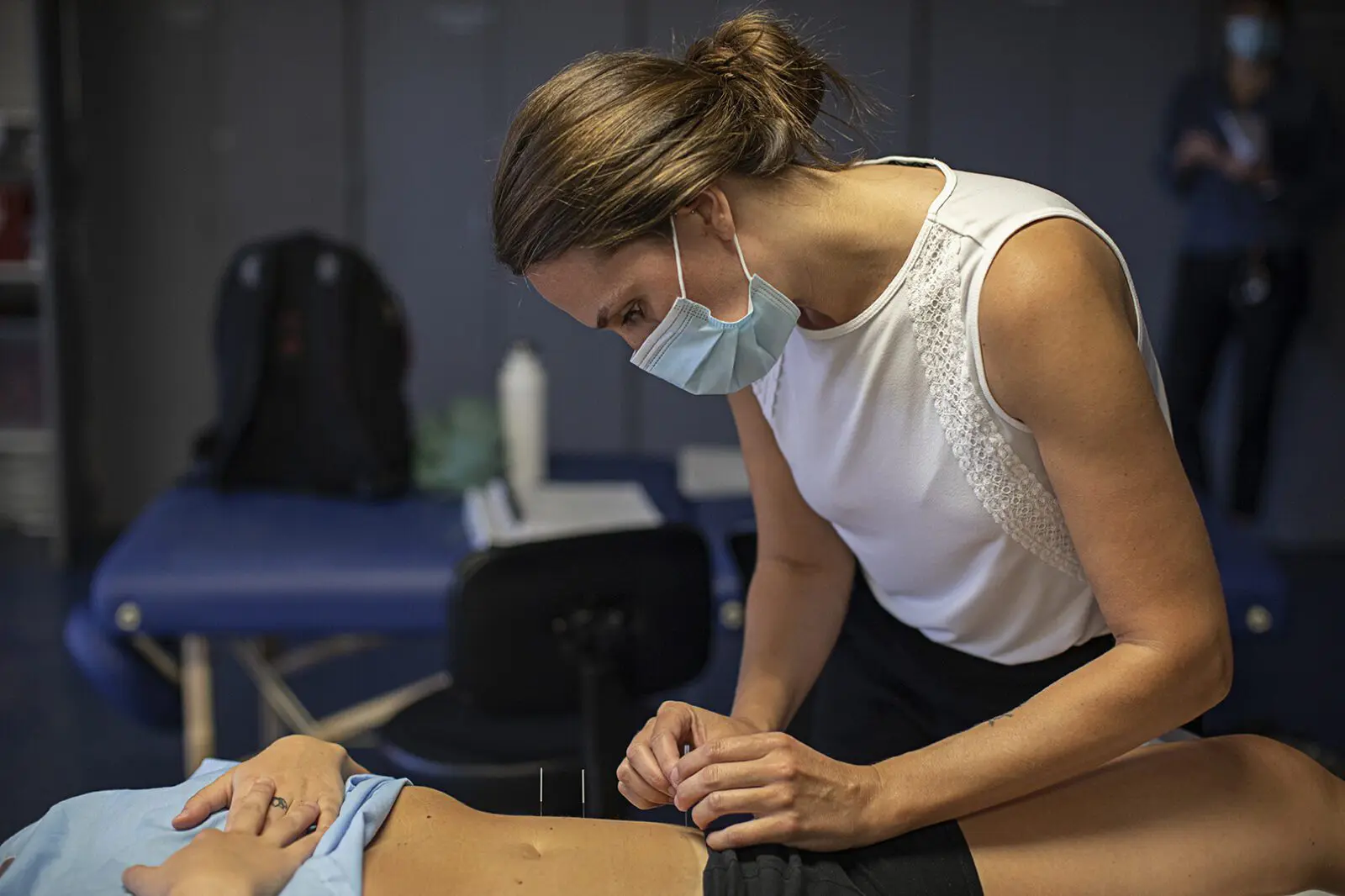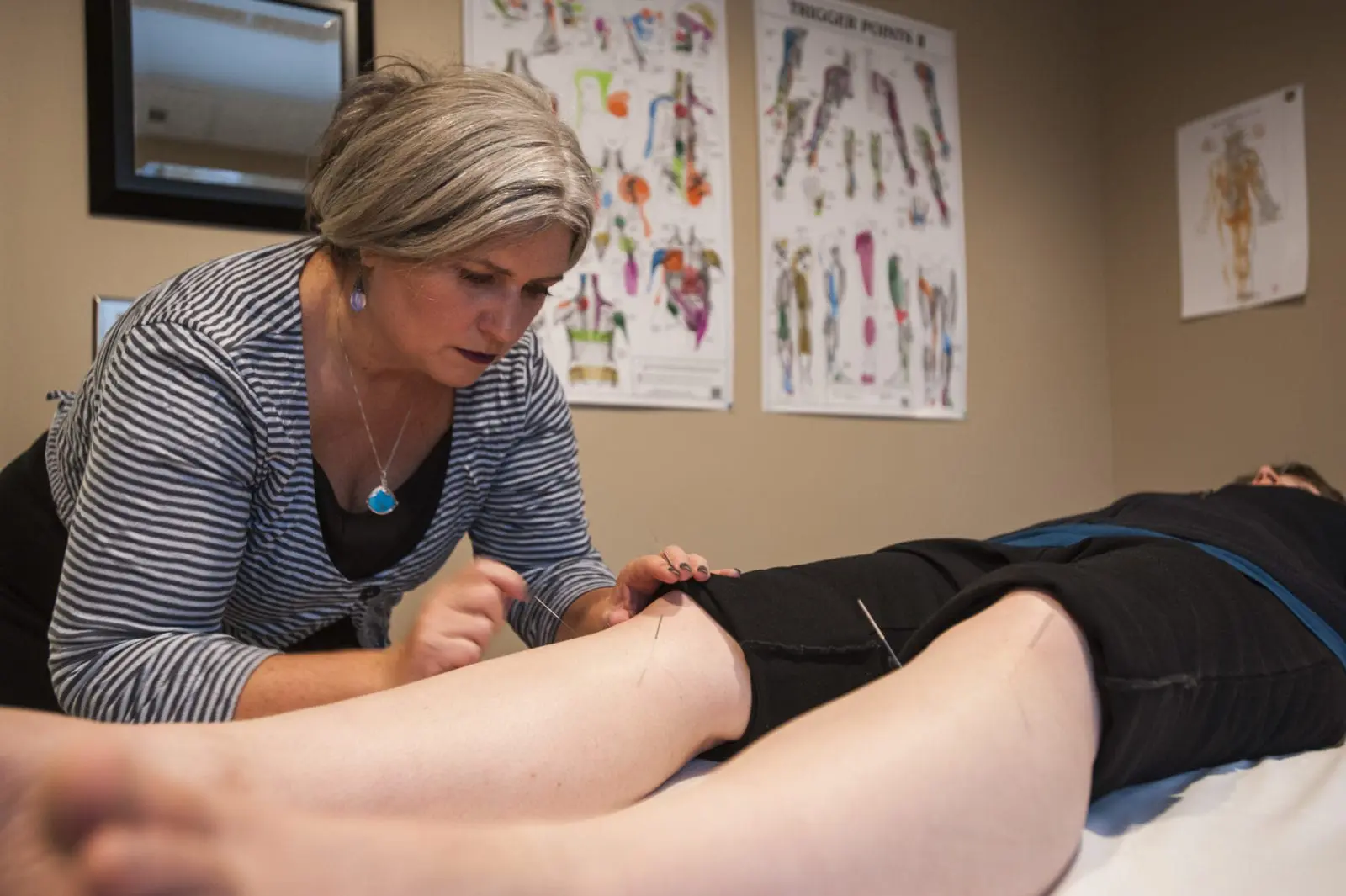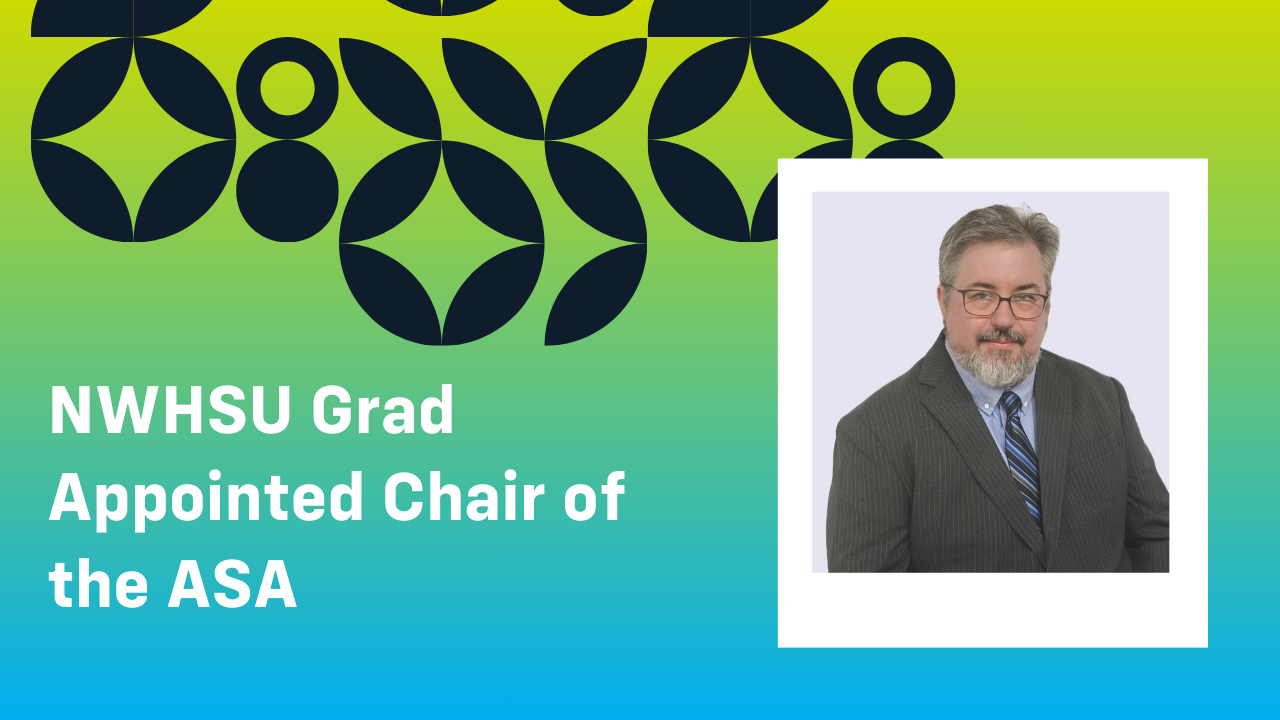How to Become an Acupuncturist
-
-
Last updated: September 11, 2025
Acupuncturists are playing an increasingly important role in healthcare today. These healthcare professionals treat illness and improve health by stimulating prescribed points on the body with sterile needles or similar techniques that use heat, pressure, or electrical stimulation.
As more and more people find value in this drug-free, non-surgical treatment method, the demand for acupuncturists will continue to grow.
If you want details on joining this fascinating profession, you’ve come to the right place. In this comprehensive overview, we’ll answer questions like the following:
Northwestern Health Sciences University (NWHSU) has been preparing students for a rewarding career in acupuncture since 1999. The following information is a great way to begin finding out how you can become an acupuncturist.
What is acupuncture?
Acupuncture is a unique system of techniques that treats illness and improves health by stimulating prescribed points on the body. Acupuncture and related techniques redirect the flow of energy, or qi (pronounced “chee”), throughout the body to restore balance. Practiced for more than 2,000 years, acupuncture is one of the safest and most well-researched forms of complementary and alternative therapies in the world. Acupuncture is an integral part of a larger medical system derived from traditional Chinese medicine. This is a comprehensive system of philosophy and treatment that addresses an individual’s total health – the physical body, the emotional body, and the mind.
What are an acupuncturist’s education requirements?
In the U.S., attending an accredited acupuncture or Chinese medicine program and obtaining a master’s degree is generally the minimum education requirement to become a practicing acupuncturist. Note that there is a movement toward doctoral degree training.
Prerequisites
For a master’s program, accredited acupuncture schools require 60 college or university level semester credits at a nationally or regionally accredited institution. For doctorate programs, 90 semester credits are required.
What are the licensure or certification requirements to become an acupuncturist?
In addition to formal education (see above), most states in the U.S. require you to pass specific certification exams to ultimately become a licensed acupuncturist.
How long does it take to become an acupuncturist?
The program length to become an acupuncturist will vary with the school and program you choose. At NWHSU, completing the Master of Acupuncture (MAc) takes 8 trimesters (or 2⅔ years). If you require greater flexibility, be sure to inquire if program faculty will work with you to design a schedule that fits your life. Programs such as NWHSU’s may offer full-time, part-time, and flexible schedules depending on your needs. Note that some schools provide more than one program for acupuncture education. For example, NWHSU also offers a Doctor of Acupuncture with a Chinese Herbal Medicine Specialization (DAcCHM) for more extensive training.
What courses do you take to become an acupuncturist?
An acupuncture program typically includes courses on Chinese medical theory, diagnosis, and treatment techniques in acupuncture and related areas.
Additional subject matters covered may include biomedical subjects such as anatomy and physiology, as well as nutrition, ethics, and practice management.
Review the curriculum of an acupuncture program to get a better understanding of the coursework involved and the path of progression to complete your degree.
Clinical training and internships are also a major component.
Five benefits of being an acupuncturist
If you’re considering various career paths and want to know why acupuncture would be a good choice, consider the following reasons.
1. Join an exciting profession in healthcare
An increasing body of scientific research supports the effectiveness of acupuncture. For example, researchers at the University of York have found that acupuncture “reduces pain levels and improves mood levels.”
Acupuncturists have opportunities to work with chiropractic doctors, medical doctors, nurses, physical therapists, and others in the healthcare industry.
In fact, career opportunities for acupuncture graduates will continue to increase as more hospitals, medical clinics, community clinics, hospices, and integrative care clinics hire acupuncturists. (For related information, see Why Acupuncture is a Great Career Choice: Growing Opportunities Within Western Medicine.)
Abbott Northwestern in Minneapolis, for example, became the first hospital in the U.S. to offer acupuncture in the emergency room as an alternative to pain medication.
2. Become a professional in the expanding natural healthcare movement
Are you compelled to help others? Are you looking for healthcare career opportunities that parallel your quest for whole-person health? If you feel a deep and abiding call to heal through natural means – and help people address disharmonies in their body, mind, and spirit – becoming an acupuncturist could be an ideal career path for you.
As non-pharmacological approaches for pain relief and overall health improvement become more common, your opportunities as an acupuncturist will continue to grow. The opioid crisis in particular is changing the way healthcare professionals think about and address pain management – and this is great news for the field of acupuncture.
Watch former NWHSU acupuncture student Angela Weber (now Dr. Angela Lipson) describe how she switched from a physician’s assistant path to studying acupuncture at NWHSU.
3. Enjoy the freedom to create your own career path
Acupuncturists enjoy a high degree of autonomy, especially compared to other healthcare professions. They typically have more freedom to set their own hours and choose the environment in which they would like to work. Self-employment is also a viable – and popular – choice for acupuncture graduates
4. Specialize in areas that fit with your interests
As an acupuncturist, you can develop a specialization path that allows you to focus on specific patient types. Pregnant women, children, cancer patients, seniors, veterans, athletes, underserved populations – these are just a handful of examples.
5. Choose from a variety of work environments
The possibilities as an acupuncturist are vast. For example, you can open your own acupuncture clinic or establish an integrative healthcare practice that offers not only acupuncture but services such as chiropractic, massage therapy, and physical therapy. (See How to Build an Integrative Healthcare Practice: One Acupuncturist’s Experience for more information.)
Acupuncturists with the proper training can also provide Chinese medicine and herbal consultation services. You also have the option to become part of a hospital or medical clinic’s staff.
For firsthand insights on being an acupuncture, be sure to read A Day in the Life of an Acupuncturist: Learn What’s It Like to Be Part of this Expanding Healthcare Field.
Key questions to ask when looking at acupuncture programs
If you’re about to explore acupuncture programs, you’ll need to weigh a number of factors. Here are some of the most important below.
If you’re looking for more in-depth information, be sure to check out What to Look for in an Acupuncture Program: 12 Must-Ask Questions for Prospective Students.
Is the school accredited?
You’ll want to attend an acupuncture program that meets official standards established within the acupuncture profession. Be sure the school you choose is accredited by the Accreditation Commission for Acupuncture and Herbal Medicine (ACAHM).
What’s the school like?
The best way to find out what an acupuncture school is like is by visiting. Schools may put on multiple admissions events a year for prospective students.
Similarly, to get a feel for the campus and the life of a student, you can schedule a tour and talk directly with faculty.
What is the program’s educational approach?
Acupuncture programs have obvious similarities with one another. After all, their goal is to ultimately prepare people to be acupuncture practitioners.
On the other hand, they can also differ in profound ways.
As you familiarize yourself with a prospective program, try to understand its educational approach. Ask questions like the following:
-
-
- How hands-on is the program? For example, NWHSU introduces hands-on skill development starting on day one and provides clinical experiences in your second trimester.
- Does the program emphasize the integration of traditional acupuncture practices with modern medicine?
- How important are evidence-based methods to the school?
- Does the school have internal clinics and external partnerships to provide an array of valuable clinical internships?
-
As you explore questions like those above, you should also ask yourself if the school’s approach resonates with how you want to learn.
But just as important, you should pay attention to how rigorous the curriculum and overall preparation is. These are what will ultimately help you become a well-prepared acupuncturist.
You can understand more about these important issues from a school’s website and program literature, as well as directly from faculty, students, and alumni.
Where is it located?
Acupuncture programs typically require extensive lab work and practice. And that means a lot of time on campus. Think through the implications of the school’s location: How far are you willing or able to travel each day? Does the school provide options that can fit with your schedule? And if you’re open to relocating, think about the area’s cost of living as well as what it has to offer in terms of quality of life – e.g., arts, entertainment, dining, neighborhoods, parks, and outdoor recreation. Remember, you may be spending at least 2 to 3 years there. Does it seem like a place where you’d enjoy living?
How much does acupuncture school cost?
This question should encompass not only tuition, fees, and supplies but also all the other expenses that will be involved in attending school. For example, how will you get to school? And what will the expenses be related to that travel? Make sure you incorporate financial concerns into your search early on. The best place to start is with a school’s financial aid specialists. Be sure to also research both school-sponsored scholarships and external scholarships.
Finally, here’s an important caveat as you research acupuncture schools: Don’t simply look for the lowest cost. Remember that the value you gain from attending a given program will depend a lot on how well it prepares you to be a successful professional.
Your next step: Request more information
Exploring the possibility of a career as an acupuncturist is an exciting time! You’ve just absorbed a lot of information on how to become one. Want help putting it all in perspective? This is a great time to reach out to NWHSU for personalized support on your path to becoming an acupuncturist.
LEARN MORE About Our Acupuncture and Chinese Medicine Programs
Published Nov. 2022. Updated May 2024.
